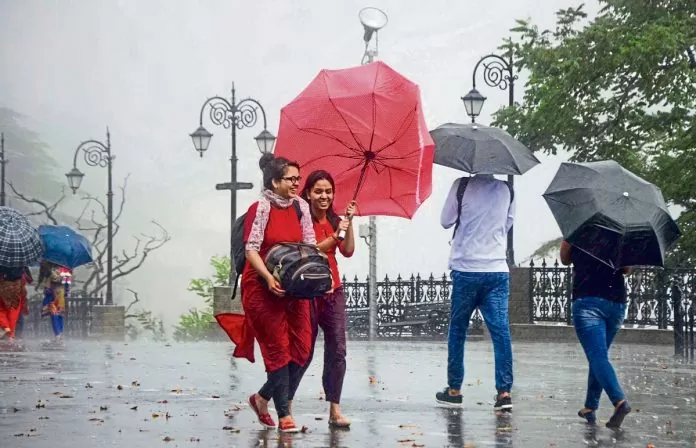Cyclone: IMD said in the bulletin issued on Friday that this cyclone will turn into a cyclonic storm by Saturday morning and will further intensify into a severe cyclonic storm by Saturday night.
Cyclone Alert: India Meteorological Department (IMD) said on Friday that the cyclone forming in the Bay of Bengal will hit the coast between West Bengal and Bangladesh at midnight on Sunday. Heavy rains are occurring in the coastal districts of the state and northern Odisha. It is the first cyclone of this pre-monsoon season in the Bay of Bengal and will be named Remal as per the system of naming cyclones in the Indian Ocean region. The name was given by Oman according to a system of naming cyclones in the northern Indian Ocean region.
IMD said in the bulletin issued on Friday that this cyclone will turn into a cyclonic storm by Saturday morning and will further intensify into a severe cyclonic storm by Saturday night. It will hit the coast between Sagar Island in West Bengal and Khepupara in Bangladesh. Under the influence of the cyclone on Sunday, the wind speed can reach 120 kilometers per hour. The Meteorological Department has warned of extremely heavy rainfall in the coastal districts of West Bengal and North Odisha on May 26-27. Parts of Northeast India may receive extremely heavy rainfall on 27-28 May. When the storm hits the coast, waves up to 1.5 meters high may arise in the coastal areas of West Bengal and Bangladesh. According to the Meteorological Department, fishermen present in the sea have been advised to return to the coast and not to go to the Bay of Bengal till May 27.
The Meteorological Department has issued a ‘red alert’ for the coastal districts of South and North 24 Parganas district of West Bengal on May 26 and 27. The department has warned of wind speed of 100 to 110 km per hour in South 24 Parganas and 90 to 100 km per hour to 110 km per hour in North 24 Parganas on May 26-27, as well. Extremely heavy rainfall is forecast at one or two places in both the places. The Meteorological Department has issued ‘Orange Alert’ for Kolkata, Howrah, Nadia and East Medinipur districts. In these districts, there is a warning of torrential rain at one or two places in the next two days along with wind speed ranging from 80 to 90 km per hour to 100 km per hour. The Meteorological Department said that the low pressure area over the central Bay of Bengal, about 660 km south-southeast of Sagar Island, is likely to turn into a cyclonic storm by the morning of May 25. The weather office has predicted heavy rain in East Medinipur on May 25.
Voting is to be held on Saturday for Tamluk and Kanthi Lok Sabha seats falling under this coastal district. The Meteorological Department said that moving towards the north, this pressure area will turn into a severe cyclonic storm by the evening of May 25. The IMD said the severe cyclonic storm is very likely to cross Bangladesh and adjoining West Bengal coasts between Sagar Island and Khepupara around midnight on May 26. Wind speed ranging from 60 to 70 kmph gusting to 80 kmph is likely to occur with heavy rain over Hooghly, East Bardhaman and Paschim Medinipur districts. The weather office said that in the remaining districts of South Bengal, wind will blow at a speed of 40 to 50 km per hour to 60 km per hour. In North Odisha, coastal districts of Balasore, Bhadrak and Kendrapara will receive heavy rainfall on May 26-27, while Mayurbhanj is likely to receive rainfall on May 27. The IMD has warned of localized flooding and widespread damage to structures, power and telephone wires, unpaved roads, crops and orchards in South and North 24 Parganas districts of West Bengal.
People in affected areas have been asked to stay indoors and evacuate vulnerable structures. Scientists say that due to higher sea surface temperatures, cyclones are becoming more intense and maintaining their strength for longer periods of time because the oceans are absorbing most of the extra energy from greenhouse gas emissions. He said that sea surface temperatures in the last 30 years have been the highest since they were recorded in 1880. According to DS Pai, senior scientist at IMD, warmer sea surface temperatures mean more moisture, which is conducive to the intensification of cyclones. Madhavan Rajeevan, former secretary of the Union Ministry of Earth Sciences, said that for a low pressure to turn into a cyclone, the sea surface temperature should be 27 degrees Celsius and above. The sea surface temperature in the Bay of Bengal is currently around 30 degrees Celsius. “The Bay of Bengal and the Arabian Sea are very warm at the moment, so tropical cyclones can easily form,” Rajeevan said. Although tropical cyclones are not only controlled by the ocean, the atmosphere also plays an important role.

